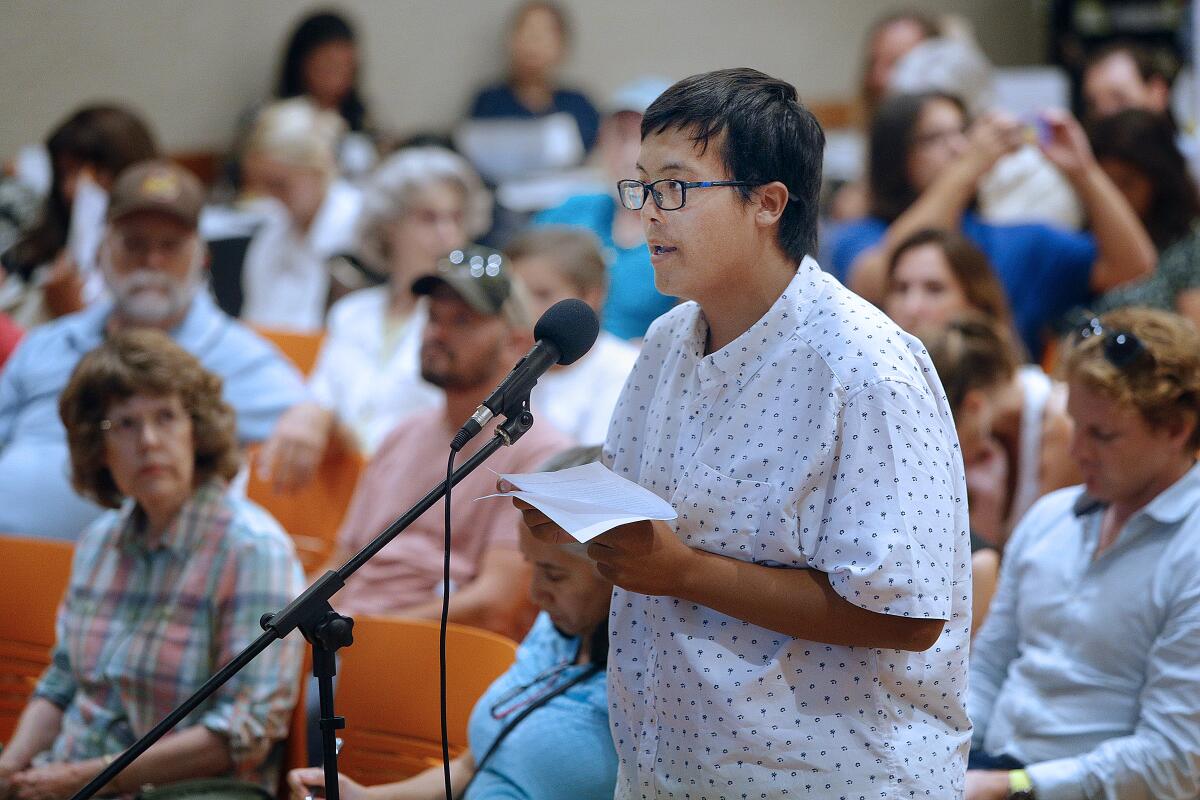Metro invites more public comments for Noho-Pasadena bus line following contentious meetings

- Share via
Nearly 120 proponents and detractors of a proposed rapid bus line that would connect Pasadena and North Hollywood showed up at a Glendale library Wednesday evening to attend what was supposed to be the last meeting to gather public input for the early-stage project.
Instead, Metro officials announced they will add another meeting next month and extend the public comment period by 15 days, citing the unexpectedly high turnout at the five scoping meetings already held about the 18-mile bus rapid-transit system, or BRT, which will connect the San Fernando and San Gabriel valleys.
The added meeting will be tentatively held from 6 to 8 p.m. on Aug. 7 at Occidental College, 1600 Campus Road, Eagle Rock , according to Metro spokesman Brian Haas. Public comments will be accepted until Aug. 15, extending the period from 45 to 60 days.
Glendale Mayor Ara Najarian called the public involvement “a good thing” during the recent meeting held at Glendale’s Downtown Central Library.
Najarian, who is on the Metro board, said he has long been waiting for the agency to begin work on the bus line, which will run through Glendale, Burbank and parts of Los Angeles on its route between the Metro Red Line in North Hollywood and Gold Line in Pasadena. Set to be completed by 2024, the project has secured $278 million in funding via Measure M, a Los Angeles County voter-approved sales tax that supports transportation projects, and Senate Bill 1, the state’s gas tax increase.
“What we want is your solid, thoughtful input,” Najarian said. “We’re here to listen to you and decide what’s going to be the very best for our communities to ultimately get cars off the road.”
Currently in an environmental-study phase, the bus line’s final route is far from set in stone although the agency has identified a preferred route, according to project manager Scott Hartwell.
Driving some contention is the Metro’s proposal to designate bus-only lanes along parts of the route. It’s also sparked debate about whether certain stretches should go along surface streets or hop on the 134 Freeway.
While the discourse at the Glendale meeting was mostly civil, a packed meeting held in Eagle Rock previously erupted into vitriolic back-and-forths between those for and against the project, according to Haas.
Still, differences of opinion emerged during the meeting this week.
“I don’t think we need more traffic in Glendale,” said local resident Nancy Pina, who added that she supports keeping buses on the freeway and off streets with heavy traffic. “This is not smart transit.” Echoing others, Pina said buses would increase traffic on main thoroughfares, such as Colorado Boulevard, and divert overflow to side streets.
South Pasadena resident Ethan Martinez, an environmental activist who appeared to be the youngest speaker, said he thinks “the buses could take a lot of cars off the road,” as well as reduce harmful emissions.
Some speakers voiced concerns that the bus line would bring increased housing density to their neighborhoods. State Senate Bill 50, shelved this past spring, would have removed some zoning restrictions around mass-transit areas.
While there’s no way to predict the fate of the bill, Metro officials can’t upzone areas, Haas said.
Further public comment will be sought after the agency completes its draft environmental-impact report next spring, Haas said.
